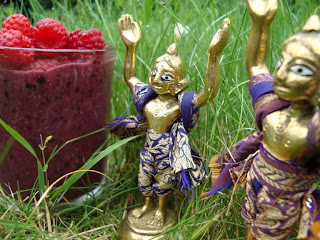Monday, July 13, 2009


ayuh-sattva-balarogya-
sukha-priti-vivardhanah
rasyah snigdhah sthira hrdya
aharah sattvika-priyah
"Foods dear to those in the mode of goodness increase the duration of life, purify one’s existence and give strength, health, happiness and satisfaction. Such foods are juicy, fatty, wholesome, and pleasing to the heart." BG 17.8
does the prasadam from our temples have those 4 qualities?
ninos chevres






que suerte tuvimos. estaban limpiando Radhakund, el lugar mas sagrado, que no es diferente de mundo espiritual. lo hacen cada 22 anos. una oportunidad de servir Radhika Mataji y banarse en la lama.
otras fotos de ninos chevres. de la escuela sandipani muni, de nandagram, kusum sarovar, donde Krishna trenzó cabello de Radhika, balaram de haridwar, otro peque de nandagram
Saturday, April 11, 2009
CHANTING
“There is no vow like chanting the holy name, no knowledge superior to it, no meditation which comes anywhere near it, and it gives the highest result. No penance is equal to it, and nothing is as potent or powerful as the holy name. Chanting is the greatest act of piety and the supreme refuge. Even the words of the Vedas do not possess sufficient power to describe its magnitude. Chanting is the highest path to liberation, peace and eternal life. It's the pinnacle of devotion, the heart's joyous proclivity and attraction and the best form of remembrance of the Supreme Lord. The holy name has appeared solely for the benefit of the living entities as their lord and master, their supreme worshipful object and their spiritual guide and mentor. Whoever continuously chants Lord Krishna's holy name, even in his sleep, can easily realize that the name is a direct manifestation of Krishna Himself, in spite of the influences of Kali-yuga.”
- Bhaktivinoda Thakura
We sometimes inquire from our conscience. Conscience says, "No, don't do this." But still we do it. Still we do... That is our avidya. Because we do not know, in ignorance, in spite of the Supreme Soul, Supersoul is forbidding, "Don't do this," still, we shall do it. That is called anumanta. We cannot do anything without the sanction of the Supersoul, but when we insist that "I must do it," then He says, "All right, you do it, but you'll suffer your sequence. My word is, Supersoul order is, that 'You give up all this nonsense. Simply surrender unto Me. I will give you all protection.' " But no, that he'll not do.
Srila Prabhupada Lecture, Bhagavad-gita 13.4, Bombay, September 27, 1973
Srila Prabhupada Lecture, Bhagavad-gita 13.4, Bombay, September 27, 1973
Sunday, January 18, 2009
jutro jade do Afryki. lot trwa 9 godzin. z londynu do nairobi. agora epoca da manga.
„Dawniej, kiedy ludzie wędrowali przez świat pieszo, jechali na wierzchowcach albo płynęli statkami, podróż przyzwyczajała ich do zmiany. Obrazy ziemi przesuwaly się przed ich oczami wolno, scena świata obracala się ledwie - ledwie. Podróż trwała tygodniami, miesiącami. Człowiek miał czas, żeby zżyć się z innym otoczeniem, z nowym krajobrazem. Klimat też zmieniał się etapami, stopniowo.” [R. Kapuściński, Heban. Warszawa 1999, s. 71.]
teraz wszystkim sie spieszy, chcemy skonczyc 3 ierunki studiow na raz, przeczytac gruba ksiazke w pol godziny, miec szybki internet, szybki samochod, szybki samolot. w indiach stanelismy w pociagu na 17 godzin. nie wiadomo dlaczego, moze maszynista poszedl odwiedzic mieszkajaca w okolicy rodzine? nie wazne. ludzie wychodza z pociagu na zielone, jedza, gadaja, nikomu sie nie spieszy. w innym miejscu hebanu kapuscinski pisal o czekaniu w afryce. ewa kiedys czekala w laosie dwa dni na autostop. pol wioski sie przysiadlo i czekalo z nia. bez slowa. bez rozmowy. po prostu. afryka chyba bedzie podobna do indii.
„Dawniej, kiedy ludzie wędrowali przez świat pieszo, jechali na wierzchowcach albo płynęli statkami, podróż przyzwyczajała ich do zmiany. Obrazy ziemi przesuwaly się przed ich oczami wolno, scena świata obracala się ledwie - ledwie. Podróż trwała tygodniami, miesiącami. Człowiek miał czas, żeby zżyć się z innym otoczeniem, z nowym krajobrazem. Klimat też zmieniał się etapami, stopniowo.” [R. Kapuściński, Heban. Warszawa 1999, s. 71.]
teraz wszystkim sie spieszy, chcemy skonczyc 3 ierunki studiow na raz, przeczytac gruba ksiazke w pol godziny, miec szybki internet, szybki samochod, szybki samolot. w indiach stanelismy w pociagu na 17 godzin. nie wiadomo dlaczego, moze maszynista poszedl odwiedzic mieszkajaca w okolicy rodzine? nie wazne. ludzie wychodza z pociagu na zielone, jedza, gadaja, nikomu sie nie spieszy. w innym miejscu hebanu kapuscinski pisal o czekaniu w afryce. ewa kiedys czekala w laosie dwa dni na autostop. pol wioski sie przysiadlo i czekalo z nia. bez slowa. bez rozmowy. po prostu. afryka chyba bedzie podobna do indii.
Sunday, January 11, 2009
Subscribe to:
Comments (Atom)















